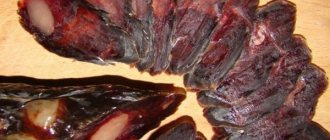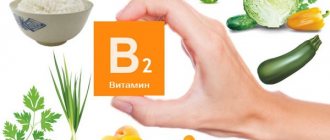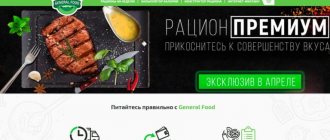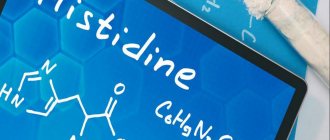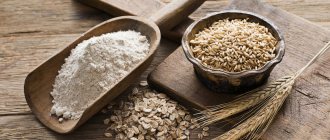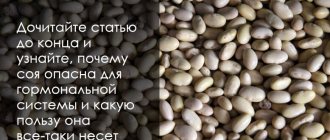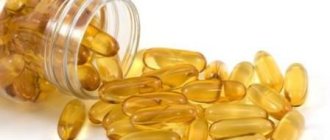Phenylalanine is an essential aromatic amino acid, the body’s reserves of which are replenished either from food (meat, dairy products, grains) or from dietary supplements.
But to get real benefits from this amino acid, the presence of vitamins B3, , , as well as copper and iron is necessary. And in the body, phenylalanine is transformed into another amino acid - tyrosine.
Role in the body
Amino acids are the nutrients that make up proteins. And phenylalanine is one of these substances. It is the “raw material” for insulin, melanin and papain.
There are three variants of this amino acid. L-phenylalanine is a natural form found in protein-rich foods. D-phenylalanine is a synthetic mirror image of the natural form, or scientifically, an isomer. But since both options have their own unique benefits, a third form of phenylalanine was created that combines the benefits of the previous two forms. Its name is DL-phenylalanine.
This amino acid is essential for the health of the central nervous system. It can relieve depression and some other mental disorders. And all this thanks to the “ability” to improve mood, relieve anxiety, concentrate attention, and improve motivation. Phenylalanine is involved in the formation of neurotransmitters such as dopamine, epinephrine, norepinephrine, on which the proper functioning of the system largely depends. It has a beneficial effect on the well-being of people suffering from chronic fatigue. Quickly restores vigor and clarity of thinking. It is also an important element for strengthening memory.
Phenylalanine promotes the formation of melatonin, which determines the correct course of sleep cycles. It is also necessary for the production of another amino acid, tyrosine, which is effective in treating anxiety and depression. And in addition, phenylalanine regulates metabolic processes, preventing excessive fat deposits.
Researchers are still not entirely clear on what principle phenylalanine works in the body, but it is already clear that it performs its signal transmission function flawlessly. And although not all the mechanisms of action on the body have been fully studied, it is known that this substance is able to penetrate the central nervous system, crossing the blood-brain barrier (this barrier protects the brain from toxins, bacteria and viruses).
And one more interesting fact. Can't overcome your excessive coffee cravings? Phenylalanine will help you get rid of coffee addiction. It will also help overcome excessive appetite.
general information
Phenylalanine (L-phenylalanine) is an essential nutrient that belongs to the class of aromatic alpha amino acids. The substance was first described in 1879, when German scientists isolated it from plant sources. The synthetic compound was obtained in 1882, but at that time they did not yet know about the importance of the amino acid for the human body. A detailed study of the pharmacological properties of the substance dates back to the twentieth century, and in 1961, phenylalanine was first synthesized through genetic engineering.
What are the benefits for the body?
There are many benefits to regularly consuming phenylalanine. This substance improves memory, increases overall concentration and learning ability, and helps the nervous system work more efficiently (transmit signals between neurons faster). Thanks to these properties, phenylalanine is an effective component in treatment programs for depression, bipolar disorder, hyperactivity, and Parkinson's disease.
Phenylalanine acts on the body as an effective pain reliever.
This ability of the amino acid is especially effective for migraines and other types of headaches. It also helps with discomfort in the neck, lower back, arthritis and during menstruation. There is evidence that phenylalanine relieves unpleasant aching sensations in places of long-standing injuries. This occurs due to the effect of the amino acid on the endogenous analgesic system, which actually suppresses the transmission of pain. Effective in the treatment of arthritis, neuralgia, seizures.
Phenylalanine can reduce symptoms of depression and anxiety. Many neurotransmitters created with the participation of amino acids are effective in improving mood, giving a feeling of well-being, helping to fight stress, and reducing anxiety and anxiety. Consuming foods rich in phenylalanine or dietary supplements containing the amino acid will help “regulate” your mood and general state of mind, leading to emotional balance more quickly.
Signs of amino acid deficiency
A lack of nutrients is observed when following an unbalanced low-protein diet and digestive dysfunction. The amino acid phenylalanine is not synthesized in the body, so unpleasant manifestations of hypovitaminosis develop quite quickly.
Key deficit indicators:
- nervous disorders, depression;
- decreased mental performance;
- deterioration of hair, nails and skin;
- causeless weight loss, loss of muscle mass;
- disorders of the thyroid and adrenal glands.
In cases of severe phenylalanine deficiency, doctors recommend taking dietary supplements that contain a highly active structural formula of the amino acid. The drugs quickly replenish phenylalanine levels and eliminate the undesirable effects of vitamin deficiency.
Source Naturals, DLPA, 375 mg, 120 tablets
★★★★☆
from 911 ₽
More details
Overdose
In some cases, phenylalanine (especially taken in large doses) can cause allergic reactions. They usually present with itching, swelling of the face or hands, difficulty breathing, and tingling in the mouth.
Other symptoms of the body's rejection of phenylalanine:
- heartburn;
- weakness;
- nausea;
- dizziness and headaches;
- anxiety;
- nervousness;
- sleep disturbance.
Doses exceeding 5 g per day can cause serious damage to the nervous system.
Application of amino acid
For medical use, supplements are available in the form of tablets and capsules. The standard concentration of phenylalanine in 1 pill is 500-750 mg. The dosage and frequency of use of dietary supplements is selected individually, taking into account the existing disease. On sale there are both mono-supplements that contain one structural isomer of the amino acid, and complex preparations with D, L-phenylalanine (DLPA).
Doctors prescribe medications for the following pathologies:
- chronic fatigue syndrome;
- depression;
- attention disorders;
- Parkinson's disease;
- alcohol or drug addiction;
- obesity;
- migraine;
- vitiligo;
- chronic pain due to cancer.
Amino acid supplements are also used by bodybuilders to grow muscles, improve body quality, and increase endurance. Sports nutrition containing phenylalanine is mainly available in powder form.
The nutrient is also used in the food industry to make the sweetener aspartame. The supplement contains 2 protein compounds: phenylalanine and aspartic amino acid.
Want to know why aspartame is harmful to the body? Watch the video:
Contraindications
Medicines containing phenylalanine are dangerous for patients with arterial hypertension, phenylketonuria, and hyperthyroidism. Supplements are harmful to pregnant women and children. The list of contraindications also includes individual intolerance to the amino acid.
Phenylalanine deficiency
Insufficient consumption of phenylalanine is fraught with a number of serious disorders in the body.
Firstly, the lack of amino acid affects the functioning of the brain - memory weakens. Secondly, an exacerbation of depression, the development of Parkinson's disease, and an increase in chronic pain are possible. A deficiency of the substance causes a decrease in muscle mass, weight loss, and hair loses its natural color.
Use with caution
There are circumstances in which it is best to avoid phenylalanine. This is particularly true for people with Parkinson's disease or schizophrenia. People who are allergic to phenylalanine should also not take medications containing the amino acid. With caution - hypertensive patients suffering from insomnia or mental disorders. Pregnant and nursing mothers are advised to avoid taking the synthetic form of the substance. For hypertensive patients, diabetics, pregnant women, people with heart failure or damage to the central nervous system, patients with radiation sickness or phenylketonuria (a genetic disease manifested by a disorder of amino acid metabolism), it is better to limit the substance to minimal consumption.
Daily norm
On average, an adult needs to receive from 2 to 4 g of phenylalanine per day. For athletes and people involved in heavy physical labor, these numbers increase several times. There are no separate recommendations for infants, schoolchildren, pregnant or lactating women.
To determine the content of the essential amino acid phenylalanine in the body, there is a laboratory analysis - chemical liquid chromatography. Venous blood is taken for testing. Normally, in the body of an adult, the concentration of the substance is 0.6-2.5 mg/dl. In pregnant women, phenylalanine levels decrease; levels in children vary depending on age. Exceeding standard values is dangerous and may indicate the development of serious diseases.
Cystine
Cystine belongs to the class of non-essential amino acids and is a powerful antioxidant used by the liver to neutralize free radicals.
In the human body, cystine is easily converted into cysteine and vice versa. Cysteine is an essential acid, similar in properties to cystine, and therefore we will further consider these amino acids as identical.
Benefits of cystine
- Promoting collagen formation.
- Improved skin elasticity and texture.
- Protection from x-rays and radiation.
- Neutralization of a number of toxic chemical compounds.
- Strengthening connective tissue.
- Prevention of premature aging.
- Promoting healing processes.
- Stimulating the activity of white blood cells.
- Reducing pain during inflammation.
- Restoration of liver cells.
- Prevention of cataract development and cancer.
- Accelerating the healing process for respiratory diseases.
What foods contain cystine?
Cystine and cysteine are present in the following foods:
- eggs;
- oats;
- corn;
- poultry meat;
- dairy products;
- wheat germ;
- garlic;
- onion;
- broccoli.
Phenylketonuria
Phenylketonuria is a hereditary disease associated with impaired phenylalanine metabolism. It is transmitted in an autosomal recessive manner, i.e. the defective gene is not located in the sex chromosomes, but in the somatic chromosomes, and for the disease to manifest, it is necessary that both genes in the patient are defective, the likelihood of which increases with consanguineous marriages. Genetically, about 400 mutations of the corresponding gene are distinguished. The prevalence in the world is 1 case per 6-10 thousand newborns, in Europe - 1 case per 4 thousand newborns.
The disease is based on a deficiency in the synthesis of the enzyme that converts phenylalanine into tyrosine, resulting in the accumulation of free phenylalanine and the products of its abnormal transformations in the blood. These substances poison the brain, causing severe progressive dementia, often accompanied by seizures.
High levels of phenylalanine in the blood serum inhibit the transport of other amino acids across the blood-brain barrier and their uptake by brain cells. The transport rates of other amino acids may be half the norm, i.e., brain cells do not have enough building material for normal functioning, which explains the clinical picture of the disease.
The diagnosis is made based on the determination of phenylalanine in the blood serum, and the sooner the better for the child and his parents. There is no treatment for this disease, because at the current level of medical development it is not possible to replace a damaged gene with a healthy one. However, if the child is fed with special formulas that do not contain phenylalanine, then terrible consequences such as dementia, etc. can be avoided.
Early symptoms of the disease are:
- Increased excitability: the child constantly screams, it is impossible to calm him down
- Motor hyperactivity
- Mold smell from urine and sweat, “mouse” body odor
- 25% of children experience seizures
- Lighter phenotype compared to healthy brothers/sisters: blond hair, fair skin, light irises.
- From 3-4 months, apathy develops, signaling organic damage to brain cells, which will subsequently manifest itself as dementia.
There is no reversal of the disease, i.e. those symptoms that have already developed will remain, so it is important to determine the presence of the disease as early as possible and begin feeding the newborn with special formulas. Breast milk is dangerous for such children.
The diet of a sick child is based on the principle of sharply limiting phenylalanine supplied with food. For this purpose, protein products are excluded. Milk, vegetables, and fruits are introduced into the diet based on the calculation of their phenylalanine content. Special protein-free products based on wheat and corn starch, protein-free vegetable and berry food additives have been developed and used. Dietary treatment is carried out under strict control of the phenylalanine content in the blood serum within the range of 3-6 mg%. Cancellation of dietary treatment is recommended no earlier than 10 years of age. The concentration of phenylalanine after discontinuation of dietary treatment should not exceed 16 mg%.
With rational dietary therapy, the persistence of pathological metabolites of phenylalanine and tyrosine in the blood and urine indicates resistance to dietary treatment and an unfavorable prognosis for the patient’s mental development. In this case, differential diagnosis of variant forms of phenylketonuria is carried out.
In the case of early diagnosis and the correct diet that excludes phenylalanine, the child grows up without serious developmental disabilities. With age, the patient switches to a less strict diet, because the rate of metabolic processes in brain cells decreases, and the toxic effect of phenylalanine also decreases, but these people are forced to adhere to dietary restrictions all their lives, incl. Avoid drinking sugary carbonated drinks that contain aspartame as a sweetener.
All bottles of sweetened carbonated drinks containing aspartame carry a warning: “not for use by patients with phenylketonuria.” Aspartame in the body breaks down into aspartic acid and phenylalanine, which is why patients with this disease should not consume these products. People with phenylketonuria are aware of their disease because the diagnosis is made in infancy.
Valin
This essential amino acid is the most important factor not only in growth, but also in the synthesis of tissues of the entire body.
With a lack of valine, sensitivity to pain, as well as to cold and heat, increases significantly. In addition, the risk of depression and multiple sclerosis increases.
Benefits of valine
- Ensuring muscle metabolism.
- Restoration of damaged tissues.
- Maintaining normal nitrogen metabolism.
- Preventing the decrease in serotonin levels.
- Regulation of nervous system functions.
- Stabilization of hormonal levels.
- Ensuring normal metabolism in muscles.
Excessive consumption of valine (we are talking about dietary supplements) can cause a sensation of “pins and needles” on the skin and even hallucinations.
What foods contain valine?
The average daily intake of valine is 3–4 g.
Foods that are a source of valine:
- mushrooms;
- meat;
- grains and legumes;
- dairy products;
- soy;
- nuts;
- salad;
- rice;
- seeds;
- fish (especially tuna, smelt, herring);
- eggs;
- chicken's meat;
- dried rice;
- lentils;
- corn flour;
- cocoa powder;
- dried parsley.
Isoleucine
Isoleucine is an essential amino acid that ensures the synthesis of hemoglobin, not to mention the stabilization and regulation of blood sugar levels.
Benefits of isoleucine
- Providing the body with energy.
- Increased endurance.
- Promoting muscle tissue recovery.
- Strengthening the immune system.
- Preventing body tissues from destruction.
- Accelerating the tissue healing process.
Isoleucine deficiency leads to irritability, fatigue, severe headaches and dizziness. An excess of this amino acid provokes an increase in the concentration of ammonia, as well as free radicals, and this can lead to quite serious poisoning.
What foods contain isoleucine?
The daily intake of isoleucine is 3–4 g.
Products with isoleucine:
- milk;
- hard cheeses;
- cottage cheese;
- feta cheese;
- nuts;
- chicken meat;
- chickpeas;
- animal liver;
- eggs;
- fish;
- seeds;
- soy;
- red and black caviar;
- seafood;
- cereals;
- cereals;
- pasta.
Arginine
Thanks to an essential acid called arginine, nitric oxide is formed, a compound responsible for the normal functioning of the cardiac, nervous, immune and endocrine systems.
It is nitric oxide that is entrusted with the “control” of not only intracellular, but also intercellular processes occurring in a living cell. Serious diseases such as hypertension, ischemia, thrombosis and cancer are caused by disruption of physiological processes regulated by nitric oxide.
Benefits of arginine
- Stimulating the immune system.
- Promoting wound healing.
- Stimulating the production of growth hormone.
- Increasing sexual activity in men by restoring erectile function, as well as stimulating spermatogenesis.
- Reducing the amount of fat stored in the body, which promotes weight loss.
- Increased muscle mass.
- Delivery of oxygen to all tissues of the body.
- Promoting the formation of muscle tissue.
- Removing toxins and normalizing liver function.
- Accelerating recovery after intense exercise.
- Reducing the concentration of bad cholesterol.
- Prevents the formation of blood clots, which reduces the risk of developing blood clots, as well as atherosclerotic plaques.
- Stimulates insulin production, which helps normalize blood sugar levels in type 2 diabetes.
- Improved mood.
- Normalization and reduction of blood pressure.
- Improving calcium absorption.
What foods contain arginine?
The daily requirement for arginine in children is 4–5 g, while in adults it is no more than 6 g.
Important!
The child's body does not synthesize arginine, so this amino acid must be supplied to it through food.
Products containing arginine:
- pumpkin seeds;
- nuts (especially walnuts and pine);
- dried peas;
- chocolate;
- coconuts;
- chicken's meat;
- salmon fillets;
- dairy products;
- pork;
- corn flour;
- beef;
- oats;
- soya beans;
- sesame;
- wholemeal wheat flour;
- yogurt;
- eggs;
- unpolished rice;
- seafood;
- liver.
